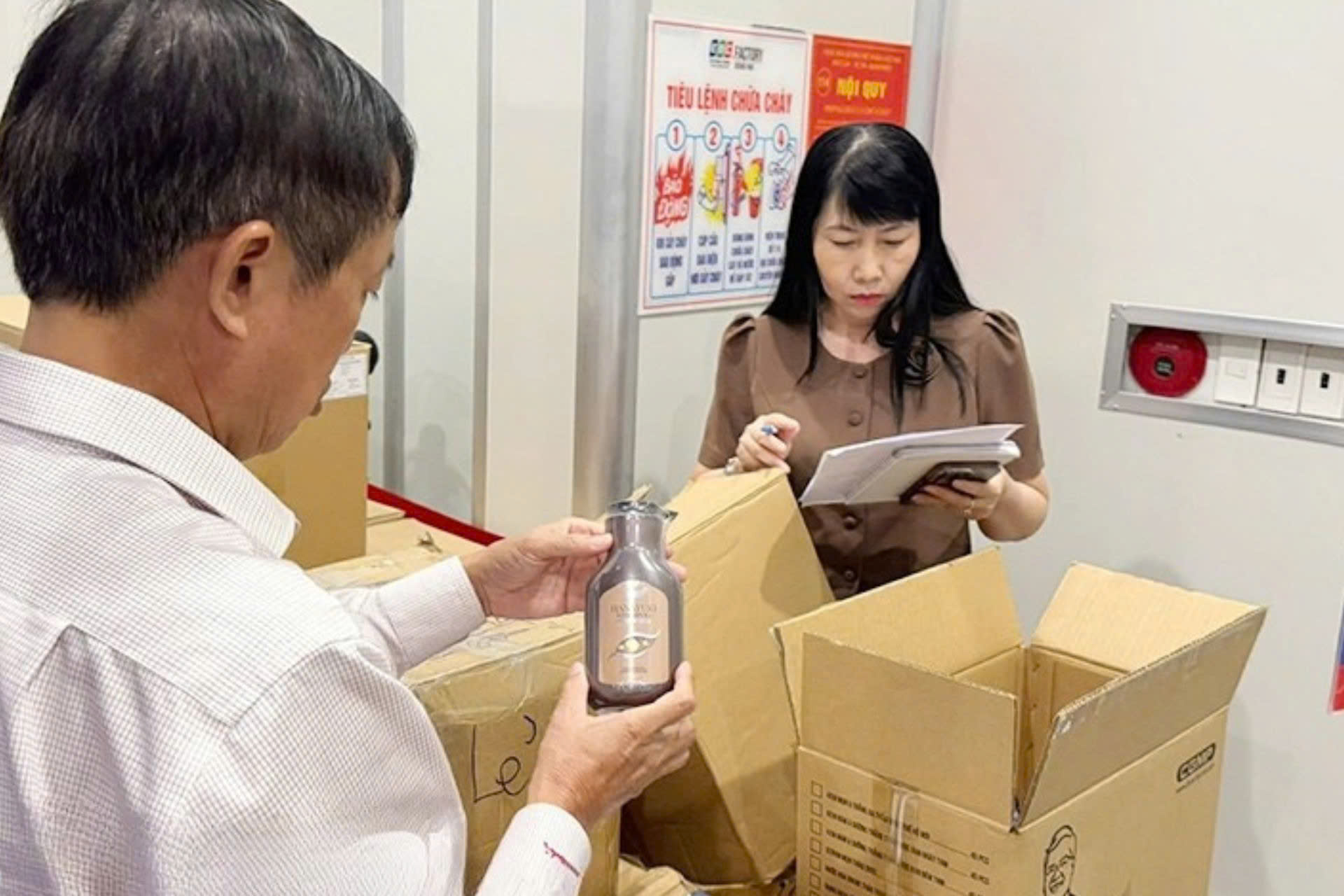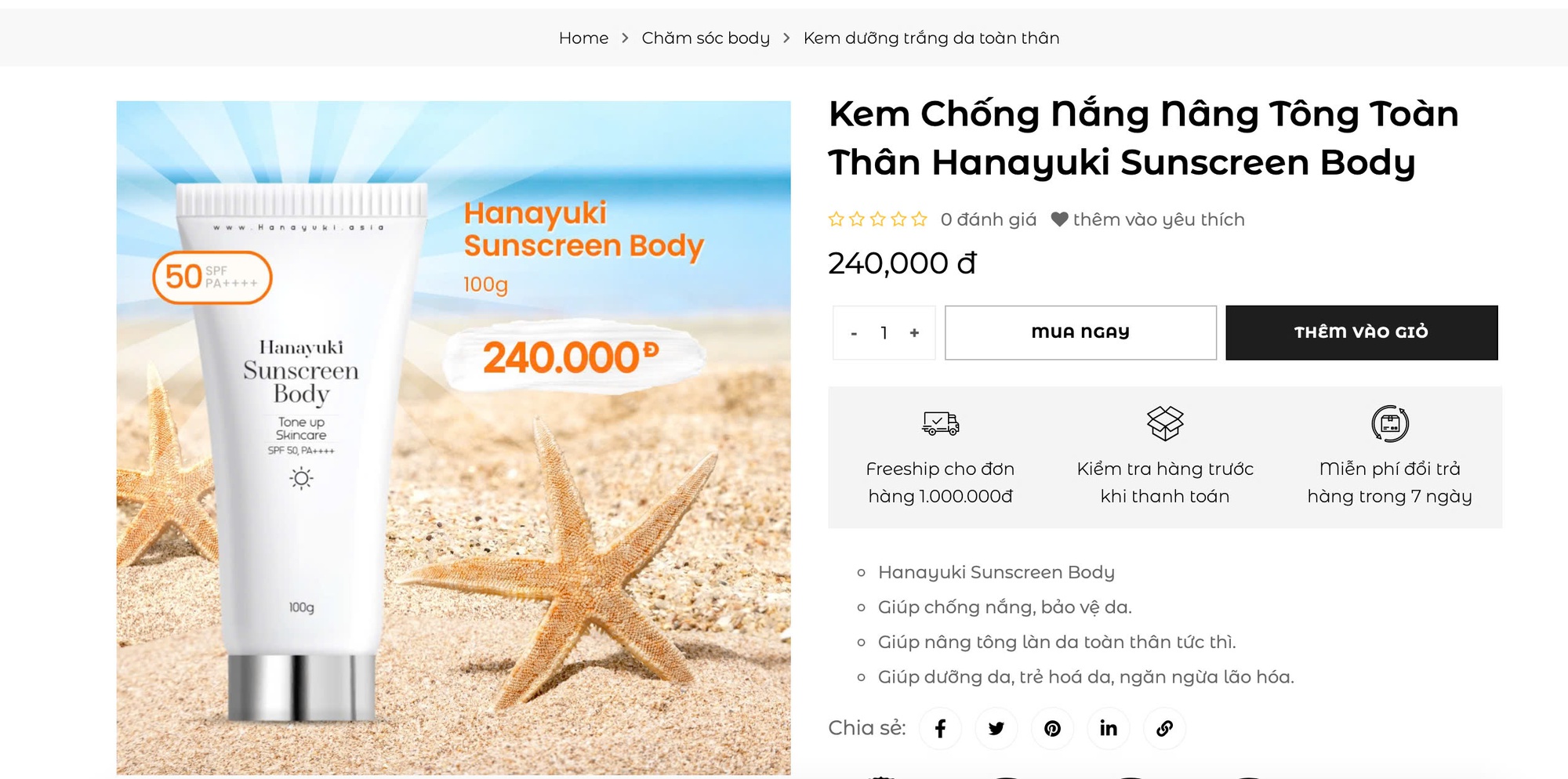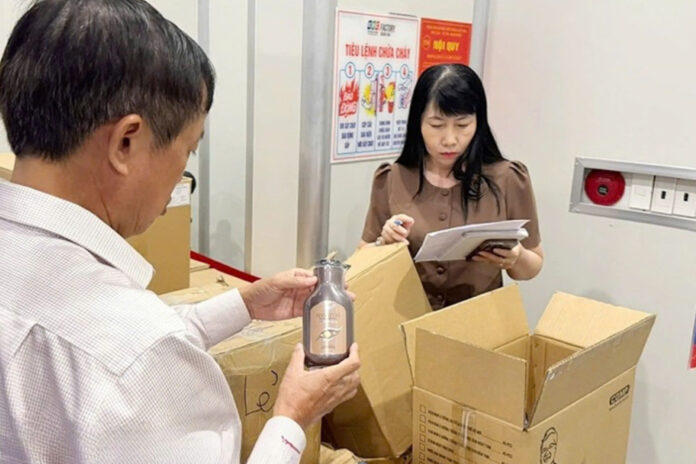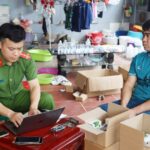Counterfeit cosmetics are a serious issue, and recently, the Bac Giang Provincial Police Investigative Security Agency has taken action. They arrested 29-year-old Nguyen Van Khanh for producing and trading counterfeit cosmetics, seizing nearly 2,500 products. The investigation revealed that Khanh was running a large-scale operation, with over 100,000 orders fulfilled through e-commerce platforms, generating illicit profits of over VND 6 billion.
Fake SPF Claims: Actual SPF 2.4 vs. Labelled SPF 50
In the past two weeks, the Drug Administration of Vietnam has recalled multiple cosmetic products with misleading labels. Among them were nine products, including facial cleansers, whitening creams, and sunscreens, from Linh Anh General Trading and Service Co., Ltd. in Phu Tho Province. Additionally, two Hanayuki-branded products, Hanayuki Shampoo (300g bottle) and Hanayuki Sunscreen Body (100g), were recalled. VB Group Joint Stock Company, represented by singer Doan Di Bang’s husband, Mr. Nguyen Quoc Vu, is the legal entity behind the Hanayuki brand.
The recalled batch of Hanayuki shampoo failed to meet quality standards and contained 2-Phenoxyethanol, which was not declared in its formula. Meanwhile, the Hanayuki sunscreen batch was seized due to misleading SPF claims. The label stated an SPF of 50, but tests revealed an actual SPF of only 2.4, almost negligible protection against the sun. Doan Di Bang had been promoting these products in the market.
These recent incidents of counterfeit and substandard cosmetics have alarmed consumers. Nguyen Bich Phuong from Dong Da District, Hanoi, shared that she often purchases cosmetics online because of the convenience and attractive prices. However, she is now hesitant to place orders due to concerns about the authenticity and safety of the products.
Social media has become a wild west for cosmetics in the 4.0 era, with genuine and counterfeit products being marketed openly but with little oversight. Consumers only receive verbal assurances from sellers regarding the authenticity of the products. In cases of skin irritation, allergies, or infections, buyers have little recourse for complaints or compensation. Alarmingly, some low-quality cosmetics contain corticoids, which can cause skin corrosion and toxicity with prolonged use. Several individuals have been hospitalized after using fast-acting whitening, acne, and pigmentation treatments purchased online.

Inspecting Hanayuki shampoo products from the batch that was suspended from circulation. Photo: NGUYEN TUAN
Enhanced Inspections and Investigations
Mr. Ta Manh Hung, Deputy Director of the Drug Administration of Vietnam, stated that they have requested the Dong Nai Health Department, the agency responsible for receiving the product declaration and issuing the declaration certificate, to further investigate the violations related to this company. “The product declaration form did not specify the sun protection factor (SPF), but the label indicated this information. Therefore, the Drug Administration decided to recall the products to protect consumers,” Mr. Hung said.
According to the Ministry of Health’s regulations, cosmetic labels must accurately reflect the content of the declared information. In this case, the declaration form did not mention an SPF of 50, but the product label did, resulting in a discrepancy between the label and the registration dossier. This violation of cosmetic labeling regulations carries administrative fines ranging from VND 30-40 million for individuals and VND 60-80 million for organizations.
On May 21, the Dong Nai Health Department conducted a surprise inspection of the products that were suspended from circulation. These products were manufactured by EBC Dong Nai Medical Equipment Joint Stock Company in Trang Bom District and distributed by VB Group Joint Stock Company in Ho Chi Minh City.

A Hanayuki-branded sunscreen product sold online. Photo: HAI YEN
During the inspection, it was found that the company was operating two production lines with a one-way workflow, separating the paths of raw materials and semi-finished products from the mixing, storage, and packaging areas. Regarding the Hanayuki shampoo, the company has announced the recall of 1,734 out of 3,840 bottles. The recalled products are currently stored in the company’s warehouse, and the remaining bottles are being retrieved by VB Group Joint Stock Company. Similarly, for the Hanayuki Sunscreen Body, the company has announced a recall of 1,652 boxes that were released to the market.
The inspection team temporarily seized some legal documents and papers related to the two products (photocopies). The company is responsible for retaining the recalled products.
Following the recall of the Hanayuki sunscreen, the Drug Administration requested the Health Departments of provinces and cities to review all sunscreen product declaration forms. They also instructed them to inspect labeling and advertising practices and conduct tests to verify product quality. Additionally, they requested the National Steering Committee for the Prevention and Combat of Smuggling, Trade Fraud, and Counterfeit Goods (National Steering Committee 389) and the Market Management Force to intensify inspections and examinations of cosmetics, especially those traded on e-commerce platforms and social media.
The leader of the Market Management Force in Ho Chi Minh City stated that cosmetics are among the key focus areas for their inspections, along with other health-related products. However, they acknowledged the challenges posed by the increasing popularity of online shopping, which makes it difficult to trace the origin of products. They also noted limitations in terms of professional expertise, technical equipment, and the lack of synchronized legal documents, creating loopholes for illegal activities.
Risk of Skin Cancer
Professor Dr. Le Huu Doanh, Director of the Central Dermatology Hospital, reported that the hospital has been receiving over 2,000 patients with skin conditions daily, including many cases of cosmetic allergies. Common symptoms include red rashes, skin peeling, itching, and mild burns. Without timely treatment, these conditions can spread, leaving scars and affecting the patient’s appearance and mental health.
Dr. Pham Thi Uyen Nhi, Deputy Head of the Planning and Synthesis Department and Head of the Clinical Trial Unit at the Ho Chi Minh City Dermatology Hospital, said that the hospital treats tens of cases of skin damage related to unclear-origin cosmetics each month. Recently, a 42-year-old female patient experienced red and peeling skin that spread to her neck, along with itching. This condition occurred after using a skincare cream gifted by an acquaintance for about a week. The treatment for such cases typically lasts between three and six months.
Dr. Nhi advised consumers to avoid using cosmetics of unclear origin, without a declaration certificate, or lacking lot number, manufacturing date, and expiration date. She also recommended against purchasing products through unverified channels such as social media, word-of-mouth, or groups. Consumers should be cautious of vague packaging and exaggerated advertising claims.
Reputable Businesses Suffer
A well-known cosmetics company in Ho Chi Minh City, famous for its perfumes loved by domestic and international consumers, shared that the rampant counterfeiting of their products through both traditional and online channels has significantly damaged their reputation and sales. To protect their brand, the company has been actively gathering evidence of violations and collaborating with authorities. They also provide guidance to consumers on distinguishing genuine products from counterfeits on their website.
Mr. Le Huu Nghia, Chairman of Le Thanh Group, which owns the AB Beauty World retail chain, expressed frustration over the proliferation of cheap “hand-carried” cosmetics, mostly counterfeits, in the online market. This situation has made it challenging for authorized distributors of authentic products to compete. “Consumers often complain about the higher prices at our stores compared to similar products sold online as ‘hand-carried’ or ‘authentic.’ For example, a genuine bottle of Versace Eros Pour Femme EDP 100ml perfume costs nearly VND 3.3 million, and even with a discount, it would still be around VND 2.7 million. In contrast, an online seller might offer it for just a few hundred thousand dong,” Mr. Nghia explained.

















